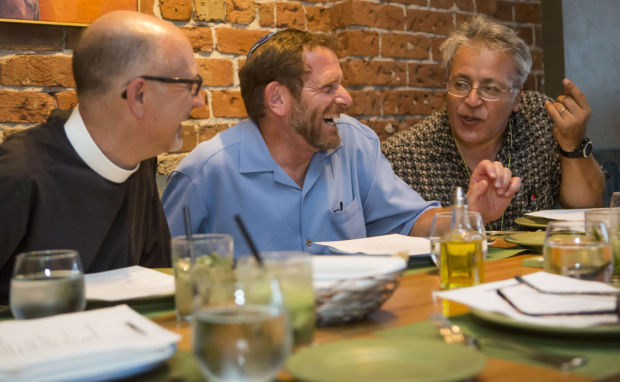A rabbi, a priest and a Muslim leader walked into Downtown Kitchen + Cocktails on Wednesday to chew over something they share: food.
To begin a meal drawing from the cuisine of Jerusalem, Rabbi Samuel Cohon, the senior rabbi of Temple Emanu-El, blessed slices of grilled flatbread, praising God first in Hebrew, then in English, for the bread.
The Rev. Greg Foraker, assistant to the rector at St. Philip’s in the Hills Episcopal Church, and Edip Yuksel, the leader of a local Islamic group who also teaches philosophy at Pima Community College, joined the meal to explore the connection between food and faith.
For the fourth summer, the restaurant’s Downtowns Around the Globe series has showcased menus inspired by international cities, alongside its usual menu. Jerusalem, the third city featured this summer, is sandwiched between last month’s tastes of Charleston, South Carolina, and Lima, Peru, coming in September. The Jerusalem menu will be offered through Sept. 1.
During his research on the city and its food, Janos Wilder, the chef and owner of Downtown Kitchen + Cocktails, discovered a basis of shared ingredients amidst diversity.
“There seemed to be such a harmony of the food that everyone was eating (in Jerusalem), the Jews, Christians and Muslims,” said Wilder. “Everyone is eating the same food. Maybe your grandmother’s recipe is different than my grandmother’s, but that’s the case everywhere.”
Wilder’s menu, inspired in part by, “Jerusalem: A Cookbook” by Yotam Ottolenghi and Sami Tamimi, includes a cocktail, three appetizers, three main courses and two desserts. Traditional dishes join more inventive creations on the menu, highlighting the flavors of the region, sometimes through a chef’s filter.
The restaurant’s take on shawarma ($23), for example, marinates and then grills a leg of lamb instead of skewering layers of the meat and cooking them on a vertical spit. Mango, diced tomatoes and cucumber, hummus and flatbread accompany the slices of meat to make for fresh and exotic finger sandwiches.
Wilder has never traveled to Jerusalem but wanted to learn more about the city and its dishes. He asked longtime friend Cohon to invite a Christian and Muslim to the dinner. The city is a pilgrimage site for three major religions.
“The New Testament isn’t about specific foods as much as how we want to make sure everyone is at the table,” Foraker said at the dinner. “It’s more about who is at the table than what’s on it.”
On Wednesday, both food and fellowship had their place, sparking conversation about memories of the region.
Cohon, among his travels to other countries in the area, has visited Israel 15 times, most recently in June. He also lived in Jerusalem for a year in the early 1990s. On Foraker’s only trip to the Holy Land in 2007, he traveled with a group of Jews and Christians. Yuksel grew up in Turkey and moved to Tucson in 1989.
On Cohon’s first visit to Israel in 1976 as a 15-year-old, he experienced the simple intensity of the ingredients and spices there.
“We had salad, and I was an American, and I thought, ‘I don’t even like salad,’ ” Cohon said. “I took a bite of a cucumber for the first time and thought, ‘Oh. That’s fantastic. That’s what it is supposed to taste like.’ ”
Yuksel remembers childhood meals of bread, feta cheese, kalamata olives and tea during days when food was scarce to feed the nine people in his family. To him, this is “holy food” and “balanced goodness” that should be shared with those in need.
On Foraker’s trip, he saw that Jerusalem dishes out cuisine that reflects both diversity and a shared need to eat — and eat well.
“It became a world tour of hummus,” said Foraker, a vegetarian for about 25 years. “It’s not one hummus. It’s many hummuses. Every place, every group and every setting had a different recipe, from smooth and mild to chunky and spicy. It became an interesting metaphor.”
Those flavors delight anywhere — just as a dish of ice cream in caramel sprinkled with sesame candy ($8) refreshes in Tucson or Jerusalem.
“The intersection of food and faith is a cliché,” Cohon acknowledged, “but when you break bread with someone and observe customs and foods and the blessings they give, you are connecting at the most human level.”





